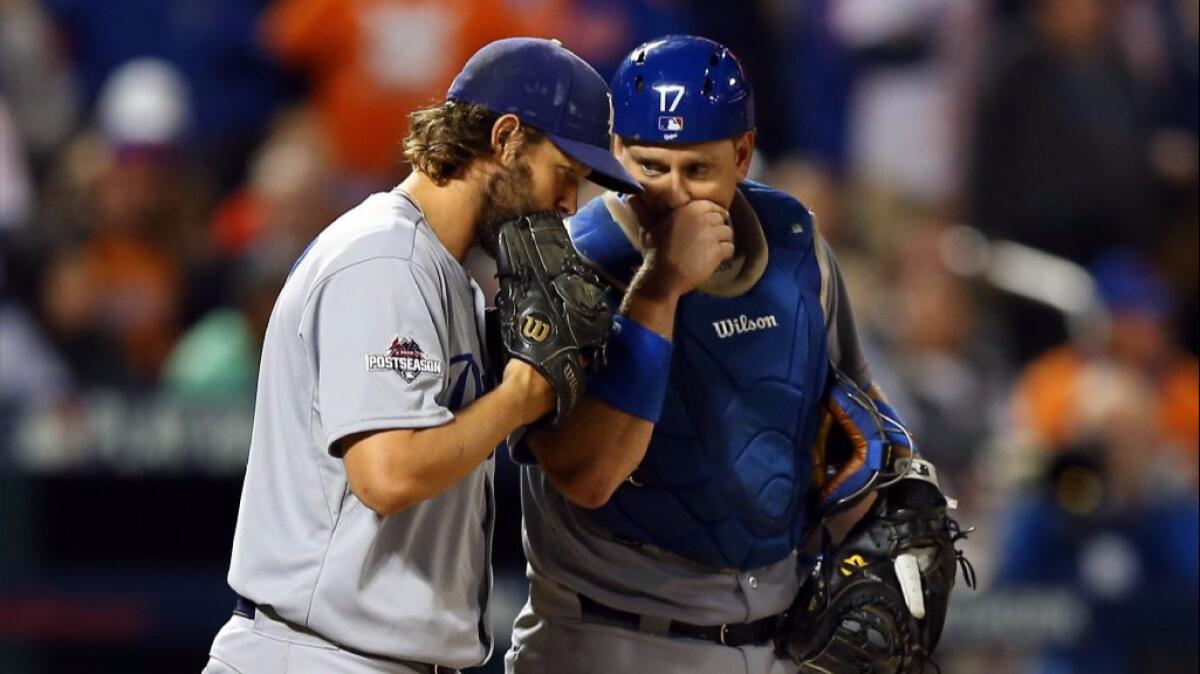A.J. Ellis and Clayton Kershaw get emotional after catcher is dealt to Phillies

- Share via
Shortly after A.J. Ellis received clarification about his future, he asked Clayton Kershaw to meet him outside by the Dodgers bench.
There, the backup catcher shared the news to his closest friend on the team. The Dodgers had traded Ellis to the Philadelphia Phillies for another veteran backstop, Carlos Ruiz.
“We both cried,” Ellis said.
They weren’t alone.
The shock waves of the trade were felt in every corner of the clubhouse Thursday. The effects were immediately visible, as only a two-out single in the ninth inning by Corey Seager spared the Dodgers the indignity of being no-hit by Matt Moore in a 4-0 loss to the San Francisco Giants at Dodger Stadium.
The reaction of the Dodgers players before and during the game raised obvious questions: Why did the Dodgers make this trade? Why now? Was it really worth upsetting the best pitcher on the planet over a couple of extra hits against left-handed pitchers in the 35 remaining regular-season games?
In his two seasons as the Dodgers president of baseball operations, Andrew Friedman has taken a number of significant risks. This trade marked his greatest gamble.
The Dodgers had recently overtaken the Giants atop the National League West. Morale was high. Chemistry was often cited for the team’s sudden surge.
All of that came crashing down with the departure of a role player who was not only the best friend of the best player, but one of the most popular players on the roster.
“All I can say is it’s a sad day today in the clubhouse,” closer Kenley Jansen said.
Jansen sighed as he recalled his farewell with Ellis.
“I almost cried in front of him,” Jansen said. “This one is tough, man.”
Several others were in disbelief.
“What the …?” one player asked.
Part of the shock resulted from the front office’s blatant disregard for Kershaw’s wishes, which were to be caught by Ellis as much as possible.
Kershaw’s preference of Ellis was the subject of a longstanding tug-of-war between Kershaw and the front office, which wanted Yasmani Grandal behind the plate as much as possible.
Ellis caught 11 of Kershaw’s 17 starts this year and 21 of 33 last year.
That was a right Kershaw had earned and something other players said he deserved.
It didn’t make sense to change that now, especially because Kershaw is taking on what could be the greatest challenge of his career, attempting to return from a herniated disk in his back that has sidelined him for the last two months.
There are whispers he could be forced to undergo surgery this winter.
This doesn’t feel like the right time to remove his greatest source of comfort, does it?
Ellis was crushed by the breakup.
“Anything can happen in the future,” he said, “but to know that in all likelihood I’ll never get to catch him again is without a doubt the most devastating thing I’m feeling right now.”
Some players interpreted the trade as a message from the front office.
This isn’t Kershaw’s team. It’s not Corey Seager’s team or Adrian Gonzalez’s, either.
It’s Friedman’s.
“We get it,” one player said.
Friedman maintained this was about offering the Dodgers the best chance to win the World Series.
While Grandal offered the Dodgers power against right-handed pitching, Ellis wasn’t doing the same when the team faced left-handers.
Ellis was batting .194.
Friedman reasoned that Ruiz and his .261 average would improve the odds.
“The grinder-type approach in the batter’s box, we think can help really lengthen our lineup,” he said.
It was important that Ruiz shared many of Ellis’ positive attributes: in particular, his ability to call games and manage a pitching staff, Friedman said.
He also was confident that the players’ shock would subside as they became acquainted with Ruiz.
Friedman said that as the trade was coming together, he considered consulting the players.
He refrained from doing so out of respect to Ellis, not wanting the catcher to hear about the deal first from his teammates.
Friedman made it a point to speak to some of the players after the deal was completed.
“At the end of the day ... it’s human nature, we’re not going to always all agree,” he said. “At least, if they disagreed ... they understood that the whole goal in everything we’re trying to do is to win.”
Ellis understood.
Still …
“I’m looking out at Dodger Stadium right now,” Ellis said. “This is really, really hard. This is the greatest office in America. I’m not going to be able to call it home any more.”
Ellis was noticeably despondent but said he would recover. The Dodgers should be concerned if their players can do the same.
Follow Dylan Hernandez on Twitter @dylanohernandez
More to Read
Are you a true-blue fan?
Get our Dodgers Dugout newsletter for insights, news and much more.
You may occasionally receive promotional content from the Los Angeles Times.









